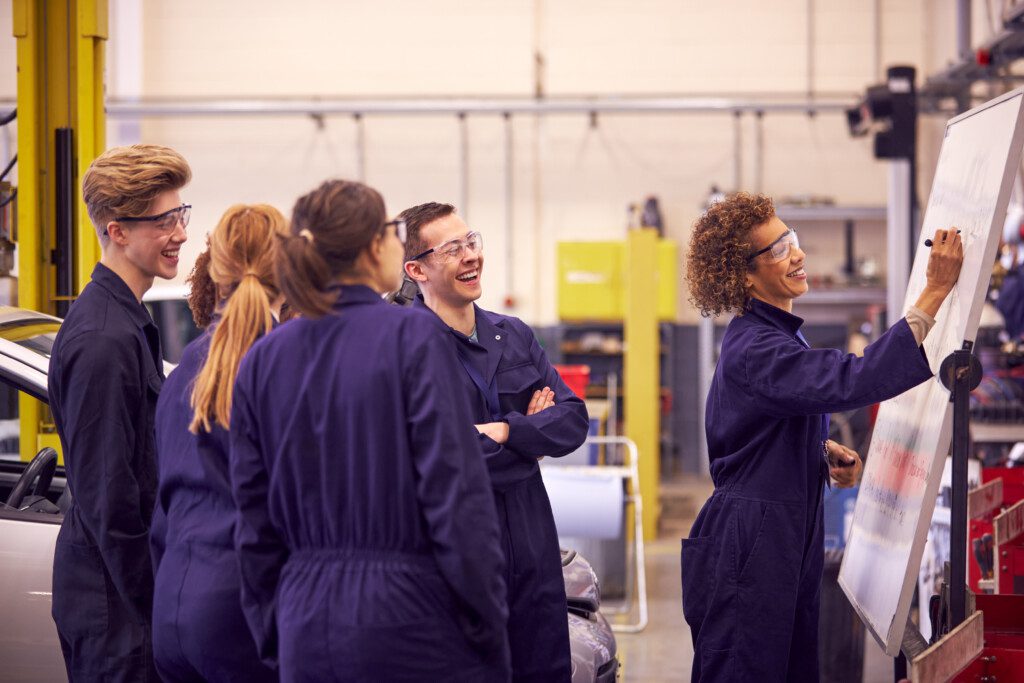The school system affects several aspects of the life in the state and its people. The functioning of the labour market and many other areas depend on education. The Swiss education system is well thought out and directly linked to the labour market. This is the reason why Switzerland is such a developed country.
Dual Swiss education system
In the land of chocolate, cheese and wine, the education system in secondary schools is based on dual education. This means that theory is linked directly to practice. It is the practical teaching that is given primary attention and is preferred to the classical memorisation of knowledge. When choosing a secondary school, pupils choose the profession and job for which a particular enterprise will prepare them, so to speak, not the school itself. That is just an supplement. They firstly choose the company where they want to be trained for a certain profession, and then the school, where they attend theoretical classes in vocational and general education subjects and part of their practical training. This way they are ready for life and can start working full-time straight after the school without the need for training.
Pupils of such vocational trainings are called apprentices. Companies are creating these jobs with limited numbers. If a student is interested in a particular trade but does not find a business where they can be trained for it, they have to choose another trade to pursue, which is a bit of a disadvantage. But since it depends on the actual demand and supply in the market, it has a positive impact on the country’s economy, as there is a reduction in the disparity between labour demand and job vacancies.
Being an employee and a student at the same time
Swiss vocational education offers a wide range of subjects such as: crafts, standard apprenticeships, banking, IT, social care, healthcare, pedagogy, manufacturing, dance. A student acquires the status of an employee upon entering vocational training. Before starting, they sign a contract with the owner of the business and the monthly salary they will receive is set. However, it is not at the same level as that of the full-time employee. The company not only prepares the apprentice for the job, but also usually provides them with a job after they leave school. Another benefit is that the young person is integrated into a team of which he or she is a full member. In companies, a responsible person must be designated to be in charge of this process. She must have completed the teaching minimum to be able to perform this function. The apprentices are scheduled to attend school for one or two days and spend three or four days a week at the company.

They can choose to work, but also to further their education
After completing their vocational training by passing the baccalaureate exam, the Swiss can work or – the better ones – apply to study at a practical college or university. In Switzerland, higher education is divided into universities, colleges and institutes of higher education. In most cases, after graduating from vocational secondary schools, students go on to vocational college and, after graduating from high school, to university. If they want to go to university after secondary vocational school, they have to complete a year’s training, during which they fill in the missing theoretical knowledge.
Compulsory schooling in Switzerland lasts nine years. Pupils can then go on to the aforementioned vocational secondary school or grammar school. Those pupils who do not know whether they want to go to grammar school or vocational school after primary school, or who have lower results, have the opportunity to enter the so-called transition year, which is a bridging period. Underachieving pupils are offered less demanding two-year courses, after which they receive a certificate. After graduation, they still have the chance to study a vocational field. Various advisers such as social workers, career counsellors and employees integrated into the vocational training system of each company help pupils to make career decisions.
Swiss education system delivers success
The vocational training system is well established in Switzerland. This is marked by an important indicator – low unemployment rate. It does not exceed 7%. Switzerland has the lowest youth unemployment rate in Europe. Whereas the current average is around 12% in OECD countries.
This system is very attractive to young Swiss as they learn practical things plus they get money while they are studying and don’t have to deal with different part-time jobs. Switzerland, as a confederation, works together with the individual cantons (member states) and the companies themselves on the vocational training system. 60% of the costs associated with the training are covered by the individual companies. They have sufficient resources to be able to finance both the production process and the vocational training of students.
This system is very beneficial and effective, as it ensures that people can get a job for life during their student days. Switzerland should serve as an example for other countries on how to improve the school system and link it to real life. At the same time, the local system gives you the opportunity to change career paths during your lifetime without any problems. It is the successful school system that makes Switzerland a pleasant country to live in, where everything works and is good to live in.
Find out what benefits attractive employers offer to reward their employees. Wondering how to manage your finances during the record price rises and inflation? You can find ideas in this blog.







